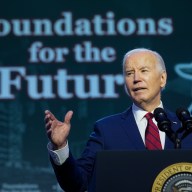Markham town council is about to make a decision that will have implications throughout the GTA. It looks like we’re going to get more urban sprawl, more traffic gridlock, more climate change and dirtier water in Lake Ontario.
It’s not that the people of Markham want this. But if politicians ignore the wishes of citizens and pander to developers who help finance election campaigns, this is what happens — and all of the GTA’s motorists and water drinkers will have to live with it.
Sprawl hurts us all. It makes public transit unworkable, so it clogs highways. It pollutes our air and warms the planet. Paving over green space destroys the natural filtering process that keeps water clean. And it’s a huge burden for taxpayers who have to pay for new roads, sewers and water on unserviced land.
All over the GTA, municipalities face the challenge of accommodating population growth. But putting subdivisions on farmland is an unsustainable growth strategy, so Markham councillors Erin Shapero and Valerie Burke have proposed stopping sprawl and preserving green space. New arrivals would live within present urban boundaries in resale family homes and low-rise multi-unit complexes, with higher density along transit corridors. A Pollara poll in Markham found that 83 per cent of respondents agree with the proposal.
Unfortunately, many developers don’t. They’ve spent hundreds of millions snapping up farmland, hoping to pave it over with subdivisions when council gives the go-ahead. With so much money at stake, it’s not surprising that they help fund many councilors’ election campaigns.
The plan to preserve green space comes before Markham council tomorrow and the vote will be close. Councillors who remember Richmond Hill’s citizen-led “Save, Don’t Pave” campaign may decide that the best place to be is on the right side of public opinion.
Adults buy farms, bulldoze trees, pave over green space and make a profit, but children pay the price. Money cannot compensate for the impact of lost green space on the air they will breathe or the water they will drink. In a hungry world, Canada’s richest agricultural land may be covered with houses and shopping malls. That’s food for thought for politicians and voters alike.
















